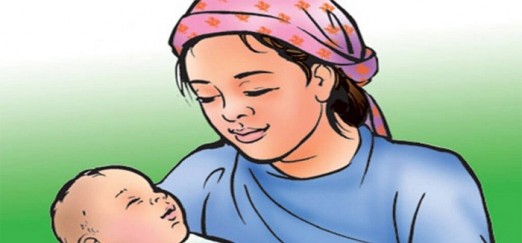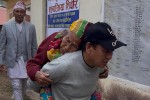Home births occur due to lack of awareness

February 23,Kathmandu.Last year alone, more than 60 women gave birth at home in Nisikhola Rural Municipality of Baglung. Two women even died prematurely. Due to lack of awareness, illiteracy, and geographical remoteness, health awareness has not yet reached some remote villages in Nisikhola.
The problem has been compounded by the fact that the number of home births in Nisikhola is not included in the municipality's statistics. Although there are statistics that 213 institutional births took place in Nisikhola rural municipality last year, there is a problem in collecting data on home births.
It has been found that due to lack of awareness, home deliveries are still common in remote villages of Nisikhola. In remote villages like Chusibang, Tighrapani, Bhurbang and Niseldhor, 40 percent of pregnant women are found to give birth at home.
The Nisikhola Health Branch has stated that home delivery has been a challenge in Nisikhola recently due to illiteracy, poverty and geographical remoteness. The municipality, which is conducting public awareness programs, has not been able to bring all pregnant women to the access of health institutions, informed the Head of the Health Branch, Juni Gharti Magar.
"The number of people giving birth at home is higher in three remote villages," said Chief Gharti Magar. "Statistics show that eight people gave birth at home last year, seven people have given birth at home in the current fiscal year, and some have given birth in mobile cowsheds."
In the last fiscal year, 213 women gave birth in Nisikhola Rural Municipality. Most of the local levels in Baglung are oriented towards zero home delivery. In Nisikhola Rural Municipality, home delivery is considered a major problem. In remote areas, it has been found that home deliveries are still taking place due to unwillingness to come to the hospital, illiteracy, poverty, etc. Most of the women who give birth at home are from the Dalit community, said Magar, head of the health branch.
According to Magar, child marriage and home births are a challenge in Nisikhola. They refuse to come to the hospital, do not inform that they are pregnant, and lie to women's health volunteers. In Chusiwang village of Nisikhola rural municipality-6, six out of 12 mothers gave birth at home, said Manimala Gharti, a local women's health volunteer. She said that among those who give birth at home, there are more women from low-income and Dalit communities.
"If there was awareness, there were facilities at the health institutions, but they don't want to inform people that they are pregnant. There is no support from the family, and on top of that, child marriages occur," said Chief Gharti Magar. "Women who go to Kharka due to nomadic migration return there after giving birth. The rural municipality and health office have started spreading awareness. Especially if they come into contact after becoming pregnant, we and the health institutions would search for them, but some people refuse to inform them."
According to Nisikhola Rural Municipality, out of 213 institutional deliveries in the last fiscal year, 58 were found to be below the age of 20. Similarly, in the current fiscal year, 18 people under the age of 20 have already given birth, according to the statistics of the municipality's health branch. There are those in the rural municipality who do not want to undergo institutional deliveries, even to hide child marriages.
Laxmi Sharma, an officer at the health office, says that the study also found that newborns lack proper nutrition. Among the 10 municipalities in Baglung, Nisikhola is the main one with the challenge of home birth.
Bareng Rural Municipality and Tamankhola Rural Municipality of Baglung have stated that they are working towards building a zero home delivery-oriented local level. Sharma says that data on home delivery is rarely available in four municipalities. Sharma says that data collection has not been possible due to the inability to inform health volunteers after pregnancy.
Health Minister Krishna Pathak informed that the Ministry of Health of Gandaki Province has intensified the nutrition awareness program keeping in mind remote villages like Nisikhola.
Share this with your friends:
प्रत्येक महिला पुरुषभन्दा कमजोर छैनन् : कमला भासिन
 नरेश ज्ञवाली ►
भदौ २७, काठमाडौं। दक्षिण एसियामा लैङ्गिक समानता, शिक्षा, गरिबी निवारण, मानवअधिकार र शान्तिका...
नरेश ज्ञवाली ►
भदौ २७, काठमाडौं। दक्षिण एसियामा लैङ्गिक समानता, शिक्षा, गरिबी निवारण, मानवअधिकार र शान्तिका...
पुरुष कलमले पूर्ण नारीलाई लेख्न सक्दैन
 काठमाडौं। मान्छेहरू कडा भएर बोलेको भन्दा नरम भएर बोलेको मनपर्छ । खरा कुराभन्दा नरम, सरस र सलिल कुराहरू मनपर्छ । तर...
काठमाडौं। मान्छेहरू कडा भएर बोलेको भन्दा नरम भएर बोलेको मनपर्छ । खरा कुराभन्दा नरम, सरस र सलिल कुराहरू मनपर्छ । तर...
कालो तिलले कम्मर दुखेको र अनुहारमा भएको पोतोको उपचार गर्छ
 काठमाडौं । कालो तिल अथवा तिलबाट प्राप्त हुने बिऊ तेल उत्पादनको लागि प्रयोग गरिन्छ । अनुहारमा चायाँ, पोतो वा दाग,...
काठमाडौं । कालो तिल अथवा तिलबाट प्राप्त हुने बिऊ तेल उत्पादनको लागि प्रयोग गरिन्छ । अनुहारमा चायाँ, पोतो वा दाग,...
दुबईमा पहिलो पटक नेपाली कल्चरल पहिरनको फेसन शो सम्पन्न
 काठमाडौं। गत माघ २८ गते दुबईमा नेपाली कल्चरल पहिरनको फेसन शो पहिलो पटक फेसन फ्युजन २०१७ सम्पन्न भयो । एनआरएन...
काठमाडौं। गत माघ २८ गते दुबईमा नेपाली कल्चरल पहिरनको फेसन शो पहिलो पटक फेसन फ्युजन २०१७ सम्पन्न भयो । एनआरएन...
उमेर अनुसारको हुनुपर्छ खान्की, अनि मात्र मानिस स्वस्थ रहन्छ
 काठमाडौं। पोषणको आवश्यकता उमेरअनुसार परिवर्तन हुन्छ । उमेरको हरेक अवस्थामा स्वयंलाई स्वस्थ राख्न शरीरलाई...
काठमाडौं। पोषणको आवश्यकता उमेरअनुसार परिवर्तन हुन्छ । उमेरको हरेक अवस्थामा स्वयंलाई स्वस्थ राख्न शरीरलाई...
यी भोजन खाए छाला सुन्दर हुन्छ !
 काठमाडौं। स्ट्रबेरी : यो भिटामिन सीले भरपुर हुन्छ । भिटामन सीले छालालाई चाउरीबाट जोगाएर सधैं जवान राख्न मद्दत...
काठमाडौं। स्ट्रबेरी : यो भिटामिन सीले भरपुर हुन्छ । भिटामन सीले छालालाई चाउरीबाट जोगाएर सधैं जवान राख्न मद्दत...
मुलुकका सम्मानित पदमा महिलाको उपस्थिति, सबैका लागि आशाको ढोका उघारे
 काठमाडौं। अहिले नेपालका तीनवटै अंगका प्रमुख महिला भएकाले नेपाली राजनीतिक क्षेत्रमा मात्र नभएर सामाजिक...
काठमाडौं। अहिले नेपालका तीनवटै अंगका प्रमुख महिला भएकाले नेपाली राजनीतिक क्षेत्रमा मात्र नभएर सामाजिक...
लोग्नेमान्छेको जात केटी देखेपछि.....
 काठमाडौं । शान्ताको विवाह भएको पाँच वर्ष बितिसक्दा पनि छोराछोरी भएनन् बरु उनलाई एकाएक ब्लड क्यान्सर भयो । समयले...
काठमाडौं । शान्ताको विवाह भएको पाँच वर्ष बितिसक्दा पनि छोराछोरी भएनन् बरु उनलाई एकाएक ब्लड क्यान्सर भयो । समयले...
मनोसामाजिक समस्या के हो?
 साउन ११, काठमाडौं । मनोसामाजिक समस्या भन्नाले मन र समाज वीच हुने समस्या हो । यो जो कोही व्यक्तिलाई पनि हुन सक्छ ।...
साउन ११, काठमाडौं । मनोसामाजिक समस्या भन्नाले मन र समाज वीच हुने समस्या हो । यो जो कोही व्यक्तिलाई पनि हुन सक्छ ।...
महिलाको दोस्रो विवाहको कुरा सुन्दा पढेलेखेकैले अनुहार बिगार्छन्
 काठमाडौं। दोस्रो विवाहबारे मैले नसोचेको, नचाहेको होइन । तर, म मेरा आत्मीयसँग फेरि विवाह गर्नेबारे कुरा गर्छु,...
काठमाडौं। दोस्रो विवाहबारे मैले नसोचेको, नचाहेको होइन । तर, म मेरा आत्मीयसँग फेरि विवाह गर्नेबारे कुरा गर्छु,...










